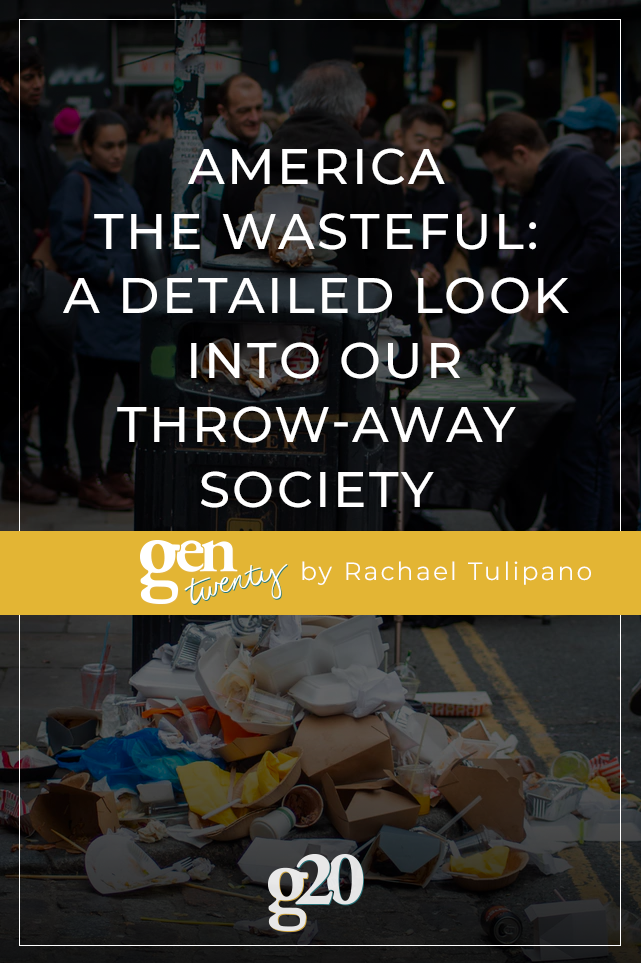
Out with the old, in with the new. This is a classic motto recycled over and over again throughout generations, often used to justify the changes permeating throughout society and our own lives. This motto, though, is recycled far more often than the material items we deem as “garbage” in America. With the amount of goods we claim as broken or useless, America is collectively renowned as a “throw-away society.”
According to statistics from 2006, Americans individually generate an average of 4.6 pounds of garbage every day. This “garbage” ranges from the obvious examples of food waste, to the material goods that have broken beyond apparent repair, to the objects we choose to abandon in exchange for their newer, more efficiently innovated counterparts. From disposable cameras to seasonal snow boots, few of today’s commodities in the market are made to last.
Not Meant To Last
During the 1920s and 1930s, the manufacturing philosophy of “planned obsolescence” was discovered. As mass production became popular and widespread, this viable business strategy was refined. Manufacturers made it a goal to produce products, or parts of goods, that break, fail, or become less desirable after a certain amount of use or time. This manipulation in the production of goods pressures consumers to replace their broken and/or less-desired products. This trend became profitable for manufacturers and is a process still used today.
Think about how this trend plays out in your life.
Cell phones and computer software are updated on an at least annual basis. How many times have you found yourself abandoning your current phone for a newer, more desirable replacement? Similarly, how often do you find yourself updating your computer software? I speak for myself when I say in the four years I have been a loyal customer of Apple products, my MacBook Pro software has been upgraded nearly three times. So far, it’s an annual update because newer is deemed better.
Manufacturers are compelled to build low quality products in hopes of earning higher profit margins. Throw-away materials guarantee customers will repurchase the same items in newer models, which is cost efficient and pure profit for manufacturers. Planned obsolescence may be manipulative against consumers, but is a smart business strategy for capitalists.
Capitalism, Supercapitalism, and Waste
Capitalism leads to a throw-away society. If you think about it, products are often outsourced, as they are made in countries with low labor costs. In turn, broken products are then repaired here in America where labor costs are extremely high. The higher profit benefits the American companies, whether the customer needs to repair a product or replace it entirely. Yet, even when products don’t need repairs they are still thrown away.
The concept of “supercapitalism”, coined by Robert Reigh, produces waste by making goods feel obsolete nearly as soon as they are purchased. With each sale of a new cell phone, computer, television, or even automobile, the product will rapidly feel outdated, leading to this cycle of waste and high replacement needs. Each new product quickly becomes old when innovations are produced before the initial invention has even finished its life cycle.

Why Americans Waste So Much
The main problem with this throw-away cycle lies in how easily consumers submit to the advertisements all around them. We are trained to be wasteful consumers based on the messages we’re confronted with on a daily basis.
Twenty-somethings, think about the hundreds of persuasive messages you encounter each day. From advertisements for new skinny jeans, to yet another deal on shoes you really don’t need nor have the room for, we are all persuaded to buy new because newer is better.
I can see the temptation. We live under a capitalist economy that works hard to produce, promote, and uphold the values of our materialistic American framework. We’re trained to always strive for more, but this onward mentality often leaves us blind to the things we already have. For this reason, it’s important to combat the throw-away mentality of always wanting more, in exchange for appreciating and valuing what we have.
Combatting the throw-away mentality
As challenging as it may seem to avoid being a throw-away citizen, there are ways of combating the disposable society we live in:
- Recycle everything you can. This doesn’t exclusively apply to recycling bottles, cans, cardboard, and plastic. You can recycle clothing by donating to local Goodwill drives, consignment shops, or the Salvation Army. Most of these companies will accept anything including clothing, shoes, books, and even used electronics.
- Invest in durable products over low-quality goods. Yes, the cost of durable products will be more expensive up front, but the product should ultimately last you far longer. Getting a full life cycle out of a product is worth the cost in the long run.
- Be an inquisitive shopper. If you already own a cell phone or computer that’s in good condition, what is the purpose of upgrading to something new? Does this new innovation come with an abundance of unique features or more refined software? If the distinctions aren’t all that different, be strong enough to say no and appreciate what you already have.
In Conclusion: America Throw-Away Society
You may find it difficult to resist the urge to toss away your “waste” and replace your life with new products, but perhaps you need some perspective. The garbage Americans collect to throw away is left at the end of their driveways every day of the week. In the United States alone, we throw away more furniture than there is furniture in most countries. Furthermore, 40-50% of all readily harvested food in America is wasted. We may live in a society of abundance, but it appears we take such ampleness for granted.
People collectively value their time and convenience far more than money. This often fuels the throw-away cycle we have started. By making small, adjustable changes in our individual lives, there is hope for a collective attempt to combat the American throw-away society we have created.
What ways do you combat being a throw-away citizen?
More Eco Friendly Living:
- Eco-Friendly Holiday Gift Guide: 15 Gifts To Give That Are Better For The Environment
- 11 Best Eco Friendly Christmas Cards 2022
- 12 Affordable Eco Friendly Swimwear Brands For Every Body (2023)
- Eco Friendly Alternatives To Aluminum Foil – 9 Picks
- 6 Zero Waste Laundry Strips
- 10 Zero Waste Laundry Strips To Try
- America the Wasteful: A Detailed Look Into Our Throw-Away Society
- The 6 Best Non-Toxic Coffee Mugs
- 10 Best Decaf Organic Coffee Brands (2023) – Must Try!
- 10 Best Organic Flavored Coffee Brands [2023]
- 11 Best Non-Toxic Coffee Maker Picks 2023
- Caraway Cookware Review: Is It Worth It?
- 8 Organic Cotton Padded Bra Options [2023]
- 6 Best Organic Tinted Moisturizer with SPF Picks for Flawless Skin
- Best Non-Toxic Facial Moisturizer For All Skin Types
- 7 Best Organic Shoes for Men – Sustainable Shoe Brands 2023
- 4 Best Organic Wine Clubs and Subscriptions (2023)
- 6 Best Non Toxic Zero Paints For a Healthy Home
- 19 Affordable Non-Toxic Makeup Brands You Have To Try
- 15 Affordable Non-Toxic Skin Care Brands
- The Best Non-Toxic Dinnerware for Healthy Eating
- The Best Non-Toxic Cookware For Healthy Eating
- Best Non-Toxic Facial Moisturizer For All Skin Types
- The Best Non-Toxic Candles
- 25 Non Toxic Indoor Plants: Safe For Pets and Kids
